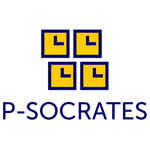 P-SOCRATES
P-SOCRATES
| FP7-ICT-611016 39 months (Oct 2013 to Dec 2016) https://p-socrates.github.io/ | |
| Summary: | The recent technological advancements and market trends are causing an interesting phenomenon towards the convergence of High-Performance Computing (HPC) and Embedded Computing (EC) domains. On one side, new kinds of HPC applications are being required by markets needing huge amounts of information to be processed within a bounded amount of time. On the other side, EC systems are increasingly concerned with providing higher performance in real-time, challenging the performance capabilities of current architectures. The advent of next-generation many-core embedded platforms has the chance of intercepting this converging need for predictable high-performance, allowing HPC and EC applications to be executed on efficient and powerful heterogeneous architectures integrating general-purpose processors with many-core computing fabrics. To this end, it is of paramount importance to develop new techniques for exploiting the massively parallel computation capabilities of such platforms in a predictable way. P-SOCRATES will tackle this important challenge by merging leading research groups from the HPC and EC communities. The time-criticality and parallelisation challenges common to both areas will be addressed by proposing an integrated framework for executing workload-intensive applications with real-time requirements on top of next-generation commercial-off-the-shelf (COTS) platforms based on many-core accelerated architectures. The project will investigate new HPC techniques that fulfil real-time requirements. The main sources of indeterminism will be identified, proposing efficient mapping and scheduling algorithms, along with the associated timing and schedulability analysis, to guarantee the real-time and performance requirements of the applications. |
| Funding: | Global: 2.76MEUR, CISTER: 544KEUR |
| Sponsors: | 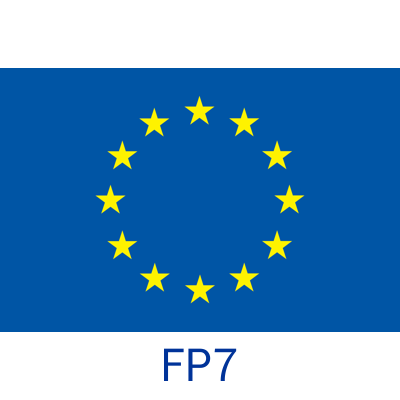 |
| Partners: | |
| Contact Person at CISTER: | Luis Miguel Pinho |
Luis Miguel Pinho presented results of CISTER projects at HiPEAC 2018 conference in Manchester

Results of successful FP7 project lead by CISTER presented to key academic and industrial European institutions at EMC2’s Safety Critical Systems Workshop
 CISTER researcher Luis Miguel Pinho gave an invited talk in the Safety Critical Systems Workshop that took place in June in Granada, Spain. He presented the results of research done at CISTER on the challenge of timing analysis for high-performance parallel systems. The talk included an overview of the current and future challenges posed to critical applications due to the unpredictable interactions in parallel platforms, as well as the work performed by CISTER to address these challenges, done in the scope of the P-SOCRATES FP7 project.
CISTER researcher Luis Miguel Pinho gave an invited talk in the Safety Critical Systems Workshop that took place in June in Granada, Spain. He presented the results of research done at CISTER on the challenge of timing analysis for high-performance parallel systems. The talk included an overview of the current and future challenges posed to critical applications due to the unpredictable interactions in parallel platforms, as well as the work performed by CISTER to address these challenges, done in the scope of the P-SOCRATES FP7 project.
The talk was organized by the EMC2 European Project, with representatives from around 100 European institutions, both academic and industry in audience. The workshop included a set of invited talks and more than 40 demonstrators of technological developments in safety-critical domains from institutions in Europe.
CISTER presents the Upscale SDK in the two largest European events on Embedded Systems
 The UpScale Software Development Kit (SDK) is a toolchain for the development of real-time high-performance applications in many-core platforms, one of the main results of the European P-SOCRATES project. The SDK targets systems that demand more and more computational performance to process large amounts of data from multiple data sources, whilst requiring guarantees on processing response times. It includes a source to source compiler, which is able to analyze source code OpenMP parallelism annotations, a lightweight OpenMP tasking runtime, an embedded many-core kernel, and an integrated toolset for the timing and schedulability analysis of real-time parallel applications (designed and implemented at CISTER). UpScale is openly available and released under commercially-friendly open source licenses.
The UpScale Software Development Kit (SDK) is a toolchain for the development of real-time high-performance applications in many-core platforms, one of the main results of the European P-SOCRATES project. The SDK targets systems that demand more and more computational performance to process large amounts of data from multiple data sources, whilst requiring guarantees on processing response times. It includes a source to source compiler, which is able to analyze source code OpenMP parallelism annotations, a lightweight OpenMP tasking runtime, an embedded many-core kernel, and an integrated toolset for the timing and schedulability analysis of real-time parallel applications (designed and implemented at CISTER). UpScale is openly available and released under commercially-friendly open source licenses.
In the scope of the dissemination of the P-SOCRATES project results, the UpScale SDK was presented at Embedded World, the international gathering for the embedded system technology sector with around 1800 participants, which took place in Nuremberg, Germany, March 14-16, and at the Design, Automation and Test in Europe conference (DATE 2017), which gathered around 1500 participants in Lausanne, Switzerland, March 27-31. At Embedded World, UpScale was also demonstrated in the exhibition space, at the booth of the Kalray company, a member of the project advisory board.
Sucessful final review of the P-SOCRATES European project
 The CISTER-led P-SOCRATES had its final review meeting in Brussels, Belgium in February. CISTER researchers Luis Miguel Pinho (project coordinator) and Vincent Nelis (work package leader), and the principal researchers of the other project partners were involved in this meeting.
The CISTER-led P-SOCRATES had its final review meeting in Brussels, Belgium in February. CISTER researchers Luis Miguel Pinho (project coordinator) and Vincent Nelis (work package leader), and the principal researchers of the other project partners were involved in this meeting.
The review was successful, with the work being highly valued by the project’s reviewers, both considering the technical results of the project as well as the joint exploitation path and plans for post-project activities.
The project consortium presented the newly developed techniques for exploiting the massively parallel computation capabilities of next-generation many-core embedded platforms in a predictable way. This work led to the release of the UpScale SDK, a Software Development Kit for the development of applications with strict timing and high-performance requirements, including a complete set of compilation and analysis tools, as well as the underlying execution environments. The SDK is provided under commercial-friendly open source licenses and will be supported by an open community.
The success of the project was also reflected in the more than 50 scientific and technical papers published in international conferences, as well as the 10 invited talks and presentations in international industrial events, such as the Embedded World exhibition and conference (with both a presentation and a demonstration scheduled for March 2017) and the Design Automation and Test Europe conference.
P-SOCRATES (Parallel Software Framework for Time-Critical Many-core Systems) started in October 2013 and was funded by the European Commission FP7 R&D Program with a budget of 3.5 M€. The project work was performed by a team of around 20 researchers from 7 partners in 4 different countries. Besides CISTER, the research partners included the Barcelona Supercomputing Centre (Spain), the University of Modena (Italy) and the Swiss Federal Institute of Technology Zurich (Switzerland). The industrial partners of the project included ATOS (Spain) and the SMEs Evidence (Italy) and Active Technologies (Italy). The project partners were supported by an industrial advisory board, which included, among others, well-known multi-national companies including Airbus, Bosch, Honeywell, or Saab.
Results of P-SOCRATES project presented in Stockholm
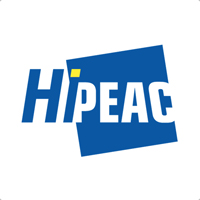 Last January, CISTER researcher Luis Miguel Pinho presented the results of the P-SOCRATES project in the 5th International workshop on the “Integration of mixed-criticality subsystems on multi-core and manycore processors”. The workshop focused on solutions for the integration of mixed-criticality subsystems on multi-core processors, integrated in the HiPEAC 2017 conference.
Last January, CISTER researcher Luis Miguel Pinho presented the results of the P-SOCRATES project in the 5th International workshop on the “Integration of mixed-criticality subsystems on multi-core and manycore processors”. The workshop focused on solutions for the integration of mixed-criticality subsystems on multi-core processors, integrated in the HiPEAC 2017 conference.
The HiPEAC conference is the premier European forum for experts in computer architecture, programming models, compilers and operating systems for embedded and general-purpose systems. The conference attracted more than 500 participants from industry and academia from 37 countries.
The presentation both provided an overview of the successful outcomes of the P-SOCRATES project, as well as in particular focusing in the timing analysis methodology of the project, a technical work performed by the ISEP team in the project.
P-SOCRATES is an FP7 European project led by CISTER, a 3-year initiative that fosters the convergence of High-Performance Computing and Embedded Computing domains. The project developed methodologies and execution environments able to deliver high throughput, suitable for computationally-intensive applications, but also predictable throughput, so that guarantees can be provided on the responsiveness on the software functionality
Industry Experts gather in Porto for P-SOCRATES Industrial Workshop
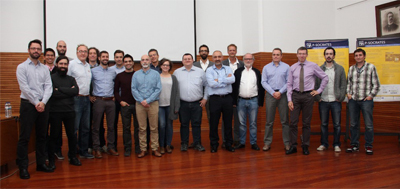 The P-SOCRATES Industrial Workshop took place at ISEP in November, a meeting organized to present the results of the P-SOCRATES European project to its Industrial Advisory Board, which includes experts from Kalray (FR), Airbus (FR), Rapita (UK), Honeywell (CZ), SAAB (SE), MBDA (IT) and Bosch (DE).
The P-SOCRATES Industrial Workshop took place at ISEP in November, a meeting organized to present the results of the P-SOCRATES European project to its Industrial Advisory Board, which includes experts from Kalray (FR), Airbus (FR), Rapita (UK), Honeywell (CZ), SAAB (SE), MBDA (IT) and Bosch (DE).P-SOCRATES (Parallel Software Framework for Time-Critical Many-core Systems) is an FP7 European project, led by ISEP, addressing the challenges of predictability and performance of current and future applications with high-performance and real-time requirements. The project developed an entirely new design framework, from conceptual design of the system functionality to its physical implementation, to facilitate the deployment of standardized parallel architectures in all kinds of real-time systems.
During the workshop, P-SOCRATES members presented technical outcomes of the project, as well as results of the evaluation campaign, discussing with the industry experts the achievements and future perspectives. This was a highly successful meeting and received very positive and encouraging feedback.
P-SOCRATES technical meeting held
 The P-SOCRATES project is entering its last phase. As the project coordinator, CISTER is responsible for orchestrating the integration of all the individual system components that have been developed over the last two and half years. This is a challenging task as it requires both a deep understanding of how the individual components work and articulate with each other as well as keeping track of every single component development by partners to guarantee timely availability.
The P-SOCRATES project is entering its last phase. As the project coordinator, CISTER is responsible for orchestrating the integration of all the individual system components that have been developed over the last two and half years. This is a challenging task as it requires both a deep understanding of how the individual components work and articulate with each other as well as keeping track of every single component development by partners to guarantee timely availability.CISTER researcher co-chairs ADA-Europe
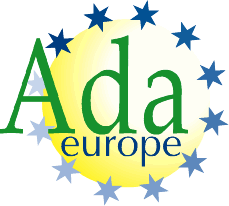 The International Conference on Reliable Software Technologies (Ada-Europe) conference has successfully established as an international forum in software technologies for critical embedded systems, with participants from both industry and academia. The 21st International Conference on Reliable Software Technologies, took place in Pisa, Italy, from June 13 to June 17, 2016. The conference was co-chaired by Marko Bertogna (Professor at University of Modena, Italy) and Luís Miguel Pinho (CISTER/INESC-TEC, ISEP).
The International Conference on Reliable Software Technologies (Ada-Europe) conference has successfully established as an international forum in software technologies for critical embedded systems, with participants from both industry and academia. The 21st International Conference on Reliable Software Technologies, took place in Pisa, Italy, from June 13 to June 17, 2016. The conference was co-chaired by Marko Bertogna (Professor at University of Modena, Italy) and Luís Miguel Pinho (CISTER/INESC-TEC, ISEP).
Various topics of interest were present, under the general umbrella of reliable software systems, with a rich program of both scientific peer-reviewed papers (published by Springer LNCS 9695), industrial presentations, and tools demonstrations. Special focus was given to the topic of safe and predictable parallel software technologies. This is an important challenge for the design of smart cyber-physical systems,and is a topic being tackled by CISTER within the P-SOCRATES European project. A special session was dedicated to the integration of safe parallelism within the Ada language, a collaboration work being done by researchers and industrialists in USA, Canada and Portugal.
The conference also featured keynote talks, from Alan Burns, Professor at the University of York, UK, on programing languages for future cyber physical systems; Guido Ghisio, responsible for Automated Driving Technologies at Magneti Marelli, Italy, on challenges for the automotive platform of the future; and Marc Duranton, senior member of CEA, France, on the HiPEAC (European Network on High Performance and Embedded Architecture and Compilation) vision.
Initiatives for cooperation: The Smart Anything Everywhere initiative and the Advanced Computing and CPS Collaboration Workshop
 The “Smart Anything Everywhere” (SAE) is a Horizon 2020 initiative centered around networks of digital competence centers for supporting SMEs and mid-caps across the economy in digital value creation. These centers, usually research technology organizations (RTOs) or technology transfer-oriented university institutes, cluster a wide spectrum of technical and application knowledge to support digital innovation.
The “Smart Anything Everywhere” (SAE) is a Horizon 2020 initiative centered around networks of digital competence centers for supporting SMEs and mid-caps across the economy in digital value creation. These centers, usually research technology organizations (RTOs) or technology transfer-oriented university institutes, cluster a wide spectrum of technical and application knowledge to support digital innovation.
SAE innovation hubs gives SMEs an opportunity to experiment with new digital technologies, try them out in their processes and work together with technology suppliers to adapt it to their specific needs. In June, CISTER researcher Vincent Nelis represented CISTER at the SAE workshop organized in Brussels. The workshop brought together high-level speakers from the European Commission, industries, competence centers, and key players in European digital technologies to share ideas on topics related to the reindustrialization of Europe and the key role to be played by SMEs.
Also in June, Vincent Nelis gave a pitch on the P-SOCRATES project, an FP7 project led by CISTER, at the "Advanced Computing and Cyber-Physical Systems Collaboration Workshop", organized along with the SAE event by HiPEAC. This collaboration workshop brought together the "Cyber-Physical Systems", "Advanced Computing" and the “Mixed Criticality Systems" project clusters financed by the European Commission under FP7 ICT Call 10 (2013), H2020 ICT Call 1 (2014) and Call 4 (2015). The main objectives of the workshop were to identify synergies and possibilities for cooperation between projects/participants; provide a better overall understanding for both the Commission staff and the project partners, of what is happening in this area of research and innovation, with possibility for Project Officers and project partners to informally assess the global progress; and identify and exchange of best practices, especially in the areas of standardization, exploitation, platform and ecosystem building.
CISTER-led HiPEAC CSW thematic session
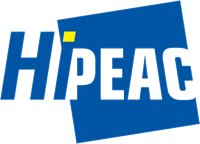
CISTER researcher Luis Miguel Pinho organized and coordinated a thematic session during the HiPEAC Computing Systems Week held in Porto at the Science and Technology Park of University of Porto (UPTEC). The session was on "Time, energy and other resources analysis for predictable parallel programming of cyber-physical systems". The event was jointly organized by the TACLe COST Action (IC1202 Timing Analysis on Code-Level) and the P-SOCRATES FP7 project.
There were two technical presentations, one from Daniel Gracia Perez (Thales, France) and another from researcher Vincent Nélis (CISTER, Portugal). In addition, Clemens Grelck (University of Amsterdam, The Netherlands) gave a presentation about a new COST Action proposal, to be submitted later in 2016. CISTER researchers Konstantinos Bletsas and Luis Miguel Pinho (the latter as the designated chair) have a central role in the preparation of this proposal, which aims to build a new community around the analysis of systems with respect to their resource requirements (time, energy, platform) and the associated trade-offs.
CISTER European Project presented to European Commissioner for Research, Science and Innovation
 Carlos Moedas, European Commissioner for Research, Science and Innovation, visited Porto this April, invited by the city mayor, Rui Moreira. In these two days the Commissioner toured the city’s innovative companies and institutions.
Carlos Moedas, European Commissioner for Research, Science and Innovation, visited Porto this April, invited by the city mayor, Rui Moreira. In these two days the Commissioner toured the city’s innovative companies and institutions.
The commissioner visited the Polytechnic Institute of Porto (P.PORTO) where, in an informal meeting, P.PORTO’s researchers presented advancements and achievements in notable international projects led by P.PORTO. In this meeting, CISTER researcher Vincent Nélis presented the results of the P-SOCRATES project, an European project led by CISTER, and discussed the project’s vision and exploitation opportunities for the foreseeable future.
A short video montage of the meeting is available at: https://www.ipp.pt/pportotv/investigacao
P-SOCRATES showcases results to the industrial advisory board
 The P-SOCRATES project, an H2020 international project led by CISTER, is a 3-year initiative that fosters the convergence of High-Performance Computing and Embedded Computing domains. The project aims at developing an execution environment able to deliver high throughput, making it suitable for computationally-intensive applications, but also a predictable throughput, so that guarantees can be provided on the responsiveness on the software functionality. The project is now entering its last phase during which all the individual components are to be assembled.
The P-SOCRATES project, an H2020 international project led by CISTER, is a 3-year initiative that fosters the convergence of High-Performance Computing and Embedded Computing domains. The project aims at developing an execution environment able to deliver high throughput, making it suitable for computationally-intensive applications, but also a predictable throughput, so that guarantees can be provided on the responsiveness on the software functionality. The project is now entering its last phase during which all the individual components are to be assembled.
On the 4th of March, the technical leaders presented to the Industrial Advisory Board their individual advancements regarding the tools and techniques developed in the project. The IAB gathers representatives of companies including Airbus, Bosch, Saab, Honeywell, and Kalray. Their feedback was as positive as it was encouraging. Discussions are already going on about an eventual integration of some of the components of the project into their flagship products. The meeting was held in Madrid with the participation of CISTER's researchers Miguel Pinho (project coordinator) and Vincent Nélis.
CISTER-led European Project meets at HiPEAC 2016
P-SOCRATES (Parallel SOftware framework for time-CRitical mAny-core sysTEmS), is an European project led by CISTER aiming to develop new techniques for exploiting the massively parallel computation capabilities of next-generation many-core embedded platforms in a predictable way.
During the last conference of the European Network of Excellence on High Performance and Embedded Architecture and Compilation (HiPEAC 2016) the P-SOCRATES consortium organized a technical meeting and a public workshop.
The workshop (4th Workshop on High-performance and Real-time Embedded Systems - HiRES 2016) co-located with the 2nd DreamCloud (Dynamic Resource Allocation and Management in Embedded, High Performance and Cloud Computing) workshop, included presentations of ongoing work and preliminary results, as well as invited talks from Prof. Akash Kumar (TU Dresden, Germany) and Dr. Gerard Rauwerda (co-founder and CTO of Recore Systems, the Netherlands).
The P-SOCRATES technical meeting had the dual purpose of preparing the work for a successful 3rd milestone of the project, as well as to prepare the forthcoming meeting with the project Advisory Board, which includes representatives from leading European companies, such as Airbus Defense and Space (France), Airbus Innovation Group (Germany), Bosch (Germany), Expert Systems (Italy), Honeywell (Czech Republic), MBDA (Italy), Saab (Sweden), Kalray (France) and Rapita Systems (UK).
CISTER Projects progress
 CISTER leads the ISEP participation in the European Project MANTIS. ISEP’s participation counts also with solid contributions from GECAD. CISTER’s Luis Lino Ferreira represented ISEP in the MANTIS kick-off meeting that was held in San Sebastian, on the 3rd and 4th of June. The meeting involved several project partners in a very intensive set of work sessions aimed at coordinating the activities. ISEP is part of a Portuguese consortium integrating INESC-TEC, UNINOVA and ADIRA.
CISTER leads the ISEP participation in the European Project MANTIS. ISEP’s participation counts also with solid contributions from GECAD. CISTER’s Luis Lino Ferreira represented ISEP in the MANTIS kick-off meeting that was held in San Sebastian, on the 3rd and 4th of June. The meeting involved several project partners in a very intensive set of work sessions aimed at coordinating the activities. ISEP is part of a Portuguese consortium integrating INESC-TEC, UNINOVA and ADIRA.
The overall concept of MANTIS is to provide a proactive maintenance service platform architecture based on Cyber Physical Systems that allows to estimate future performance, to predict and prevent imminent failures and to schedule proactive maintenance.
In this project CISTER leads two work packages, one related to dissemination and another related to the development and integration of sensors into industrial equipment (development of sensors for maintenance, their communication protocols and middlewares). CISTER will also collaborate with the Portuguese consortium on an industrial pilot.
 On May 4-6, Luis Miguel Pinho and Vincent Nelis, from CISTER, attended the second review meeting of P-SOCRATES, organised in Oslo, Norway, within the block review week, organized by the European Commission (CNECT A3) which brought together the “Advanced Computing project cluster”: the group of FP7 projects working in the area of Advanced Computing and financed by the European Commission under ICT Call 10. During the meeting the consortium presented the current status of his work, with the progress and results achieved so far. The overall feedback was that the P-SOCRATES project has successfully met all its objectives in developing individual software/analysis components, the integration of those components being the target for the next milestone next year. The official review report, received last week, provides very positive remarks, both on the technical outcomes of the period, as well as in the proactive and collaborative work of the project partners.
On May 4-6, Luis Miguel Pinho and Vincent Nelis, from CISTER, attended the second review meeting of P-SOCRATES, organised in Oslo, Norway, within the block review week, organized by the European Commission (CNECT A3) which brought together the “Advanced Computing project cluster”: the group of FP7 projects working in the area of Advanced Computing and financed by the European Commission under ICT Call 10. During the meeting the consortium presented the current status of his work, with the progress and results achieved so far. The overall feedback was that the P-SOCRATES project has successfully met all its objectives in developing individual software/analysis components, the integration of those components being the target for the next milestone next year. The official review report, received last week, provides very positive remarks, both on the technical outcomes of the period, as well as in the proactive and collaborative work of the project partners.
 The CarCoDe project reached its completion in June 2015, and the partners of the project organized a final event in Castelo Branco, Portugal to discuss the final results internally, and to disseminate them to the general public. On June 2nd, the CarCoDe consortium held the General Assembly, attended by Michelle Albano from CISTER, which focused on preparing the final reports for the project, and setting up the workshop scheduled for the following day.
The CarCoDe project reached its completion in June 2015, and the partners of the project organized a final event in Castelo Branco, Portugal to discuss the final results internally, and to disseminate them to the general public. On June 2nd, the CarCoDe consortium held the General Assembly, attended by Michelle Albano from CISTER, which focused on preparing the final reports for the project, and setting up the workshop scheduled for the following day.
The workshop was attended by important actors in the Portuguese and international automotive industry and PAs, such as BMW, Toyota, the European Commission, Airbus, Portugal Telecom, Alcatel-Lucent, the Municipality of Castelo Branco, and Business Association of Beira Baixa. The workshop had media coverage by both the national television SIC, and the magazine Exame Informática.
Embraer visits CISTER

CISTER participates in ARTEMIS CO-SUMMIT
 CISTER Researchers Luis Lino Ferreira, Geoffrey Nelissen, Eduardo Tovar and Luis Miguel Pinho participated in the 2015 Artemis/ITEA Co-summit held in Berlin. They were representing CISTER as members of several ongoing and finalized European projects, namely: EMC2, CONCERTO, Arrowhead, ENCOURAGE, CarCode and P-SOCRATES.
CISTER Researchers Luis Lino Ferreira, Geoffrey Nelissen, Eduardo Tovar and Luis Miguel Pinho participated in the 2015 Artemis/ITEA Co-summit held in Berlin. They were representing CISTER as members of several ongoing and finalized European projects, namely: EMC2, CONCERTO, Arrowhead, ENCOURAGE, CarCode and P-SOCRATES.
The Co-summit 2015 organized by ARTEMIS Joint Undertaking on embedded systems and ITEA, the EUREKA Cluster on software-intensive systems and services – counted about 700 participants from industry, academia, public authorities and press from all over Europe. This year's theme was: Smart Industry: Impact of Software Innovation.
During this event, Eduardo Tovar participated in the Artemis General Assembly and the election for the Artemis Steering Board as a candidate. Luis Miguel Pinho was invited to present a talk in the Speakers Corner on Mixed Criticality related to the actual status of the CISTER-lead European project P-SOCRATES. Geoffrey Nelissen represented CISTER in the CONCERTO booth and Luis Lino Ferreira was also representing CISTER in the CarCode and Arrowhead booths.
Finally, Luis Miguel Pinho and Luis Lino Ferreira, together with the ENCOURAGE project leader Arne Skou, received the achievement award for the successful finalization of the ENCOURAGE project.
CISTER-lead European project P-SOCRATES meets in Porto

Borislav Nikolic, Luis Miguel PinhoReal-Time Systems, Springer. 30, Mar, 2017, Volume 53, Issue 4, pp 578-612.
Cláudio Maia, Patrick Meumeu Yomsi, Luis Miguel Nogueira, Luis Miguel PinhoEURASIP Journal on Embedded Systems, Article No 2017:31, Springer International Publishing. 2017, pp 1-14.
Muhammad Ali Awan, Patrick Meumeu Yomsi, Geoffrey Nelissen, Stefan M. PettersReal-Time Systems (RTSJ), Springer. Jul 2016, Volume 52, Issue 4, pp 450-485.
Dakshina Dasari, Vincent Nélis, Benny ÅkessonReal-Time Systems (RTS), Springer. May 2016, Volume 52, Issue 3, pp 272-322. U.S.A..
Luis Miguel Pinho, Vincent Nélis, Patrick Meumeu Yomsi, Eduardo Quiñones, Marko Bertogna, Paolo Burgio, Andrea Marongiu, Claudio Scordino, Paolo Gai, Michele Ramponi, Michal MardiakMicroprocessors and Microsystems (MICPRO), Elsevier. Nov 2015, Volume 39, Issue 8, pp 1190-1203.
Matthias Becker, Borislav Nikolic, Dakshina Dasari, Benny Åkesson, Vincent Nélis, Moris Behnam, Thomas Nolte24th IEEE Real-Time and Embedded Technology and Applications Symposium (RTAS 2017). 18 to 20, Apr, 2017, pp 101-112. Pittsburgh, U.S.A..
Luis Miguel Pinho, Vincent Nélis, Eduardo Quinoñes, Paolo Burgio, Andrea Marongiu, Paolo Gai, Juan SanchoEmbedded World Conference 2017. 14 to 16, Mar, 2017, Session 19: HiPEAC – High Performance Embedded Architectures. Nuremberg, Germany.
Borislav Nikolic, Luis Miguel Pinho, Leandro Indrusiak22nd IEEE International Conference on Embedded and Real-Time Computing Systems and Applications (RTCSA 2016). 17 to 19, Aug, 2016. Daegu, South Korea.
Vincent Nélis, Patrick Meumeu Yomsi, Luis Miguel Pinho16th International Workshop on Worst-Case Execution Time Analysis (WCET 2016). 5, Jul, 2016. Toulouse, France.WCET was held as part of ECRTS 2016 that took place in Toulouse, France on July 5-8, 2016.
José Fonseca, Geoffrey Nelissen, Vincent Nélis, Luis Miguel Pinho11th IEEE International Symposium on Industrial Embedded Systems (SIES 2016). 23 to 25, May, 2016. Krakow, Poland.
S. Tucker Taft, Brad Moore, Luis Miguel Pinho, Stephen Michell18th International Real-Time Ada Workshop (IRTAW 2016). 11 to 13, Apr, 2016. Benicàssim, Spain.
Luis Miguel Pinho, Brad MooreWork in Progress Session, IEEE Real-Time Systems Symposium (RTSS 2015). 1 to 3, Dec, 2015. San Antonio, U.S.A..
Cláudio Maia, Patrick Meumeu Yomsi, Luis Miguel Nogueira, Luis Miguel Pinho13th IEEE/IFIP International Conference on Embedded and Ubiquitous Computing (EUC 2015). 21 to 23, Oct, 2015, Session W1-A: Multiprocessing and Multicore Architectures. Porto, Portugal.
Luis Miguel Pinho, Vincent Nélis, Patrick Meumeu YomsiINForum - Simpósio de Informática (INFORUM 2015). 7 to 8, Sep, 2015. Portugal.
Vincent Nélis, Patrick Meumeu Yomsi, Luis Miguel PinhoThe Euromicro Conference on Digital System Design (DSD 2015). 26 to 28, Aug, 2015. Funchal, Portugal.
Cláudio Maia, Luis Miguel Nogueira, Luis Miguel Pinho6th Real-Time Scheduling Open Problems Seminar (RTSOPS 2015). 7, Jul, 2015. Lund, Sweden.
Geoffrey Nelissen, José Fonseca, Gurulingesh Raravi, Vincent Nélis27th Euromicro Conference on Real-Time Systems (ECRTS 2015). 7 to 10, Jul, 2015. Lund, Sweden.
José Fonseca, Vincent Nélis, Geoffrey Nelissen, Luis Miguel Pinho6th Real-Time Scheduling Open Problems Seminar (RTSOPS 2015). 7, Jul, 2015. Lund, Sweden.
Luis Miguel Pinho, Brad Moore, Stephen Michell, S. Tucker Taft20th International Conference on Reliable Software Technologies - Ada-Europe 2015 (Ada-Europe 2015). 25 to 29, Jun, 2015. Madrid, Spain.Best Paper Award.
Luis Miguel Pinho, Brad Moore, Stephen Michell, S. Tucker TaftInternational Real-Time Ada Workshop (IRTAW 2015). 20 to 22, Apr, 2015. Pownal, U.S.A..
José Fonseca, Vincent Nélis, Gurulingesh Raravi, Luis Miguel PinhoThe 30th ACM/SIGAPP Symposium On Applied Computing (SAC 2015). 13 to 17, Apr, 2015, Embedded Systems. Salamanca, Spain.
Vincent Nélis, Patrick Meumeu Yomsi, Luis Miguel Pinho, Eduardo Quiñones, Marko Bertogna, Andrea Marongiu, Paolo Gai, Claudio Scordino3rd Workshop on High-performance and Real-time Embedded Systems (HIRES 2015). 21, Jan, 2015. Amsterdam, Netherlands.
Vincent Nélis, Patrick Meumeu Yomsi, Luis Miguel Pinho, Guillem BernatWork in Progress Session, IEEE Real-Time Systems Symposium (RTSS 2014). 2 to 5, Dec, 2014. Rome, Italy.
Kostiantyn Berezovskyi, Luca Santinelli, Konstantinos Bletsas, Eduardo Tovar22nd International Conference on Real-Time Networks and Systems (RTNS 2014). 8 to 10, Oct, 2014. Versailles, France.
Cláudio Maia, Marko Bertogna, Luis Miguel Nogueira, Luis Miguel Pinho22nd International Conference on Real-Time Networks and Systems (RTNS 2014). 8 to 10, Oct, 2014. Versailles, France.
Luis Miguel Pinho, Eduardo Quiñones, Marko Bertogna, Andrea Marongiu, Jorge Pereira Carlos, Claudio Scordino, Michele RamponiEuromicro Conference on Digital System Design (DSD) (DSD 2014). 27 to 29, Aug, 2014. Verona, Italy.
Vincent Nélis, Patrick Meumeu Yomsi, Luis Miguel Pinho, José Fonseca, Marko Bertogna, Eduardo Quiñones, Roberto Vargas, Andrea Marongiu14th International Workshop on Worst-Case Execution Time Analysis (WCET 2014). 8, Jul, 2014. Madrid, Spain.
José Fonseca, Vincent Nélis, Gurulingesh Raravi, Luis Miguel Pinho5th Real-Time Scheduling Open Problems Seminar (RTSOPS 2014). 8, Jul, 2014. Madrid, Spain.
Luis Miguel Pinho, Eduardo Quiñones, Marko Bertogna, Luca Benini, Jorge Pereira Carlos, Claudio Scordino, Michele Ramponi2nd Workshop on High-performance and Real-time Embedded Systems (HiRES 2014). 20, Jan, 2014. Vienna, Austria.
Borislav Nikolic, Patrick Meumeu Yomsi, Stefan M. Petters20th IEEE International Conference on Embedded and Real-Time Computing Systems and Applications (RTCSA 2014). 2014, Real-Time Systems Track. Chongqing, China.
Luis Miguel PinhoDemo in Design, Automation and Test in Europe (DATE 2017). 27 to 31, Mar, 2017, 6.8 HiPEAC: European Network on High Performance and Embedded Architecture and Compilation. Lausanne.
Vincent Nélis, Luis Miguel PinhoDemo in RTSS@Word Demo Session, IEEE Real-Time Systems Symposium (RTSS 2015). 1 to 4, Dec, 2015. U.S.A..
Project consortiumPoster presented in 12th Conference on High Performance and Embedded Architecture and Compilation (HIPEAC 2017). 23 to 25, Jan, 2017, EU Projects Poster Session. Stockholm, Sweden.
Poster presented in 11th Conference on High Performance and Embedded Architecture and Compilation (HIPEAC 2016). 18 to 20, Jan, 2016, Poster Session. Prague, Czechia.









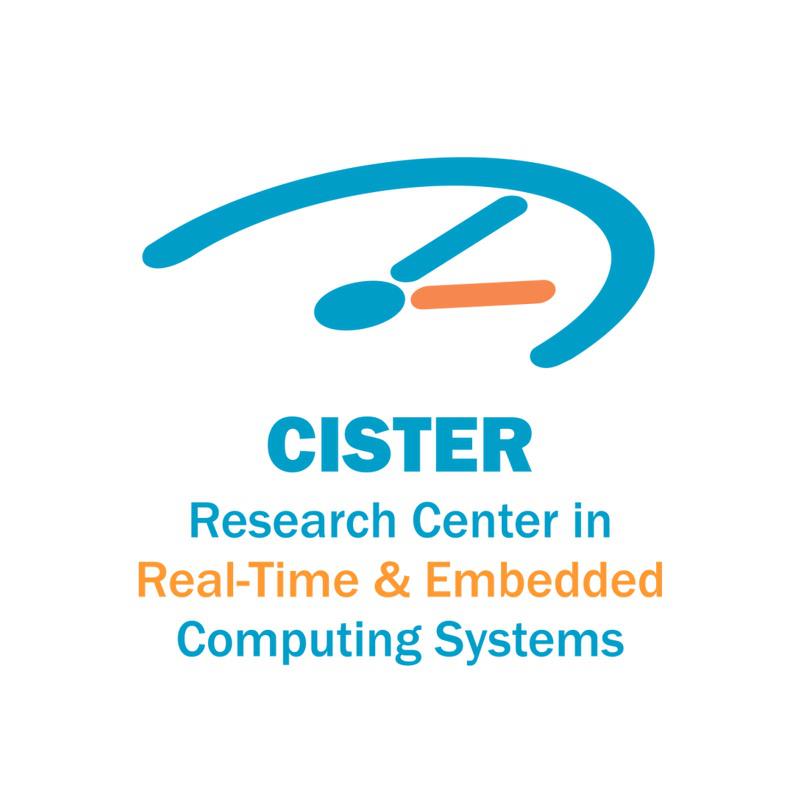
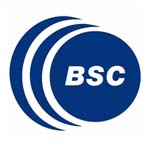
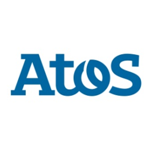

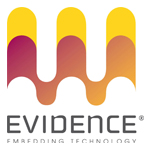

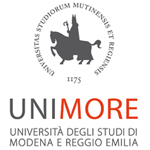
 PDF
PDF